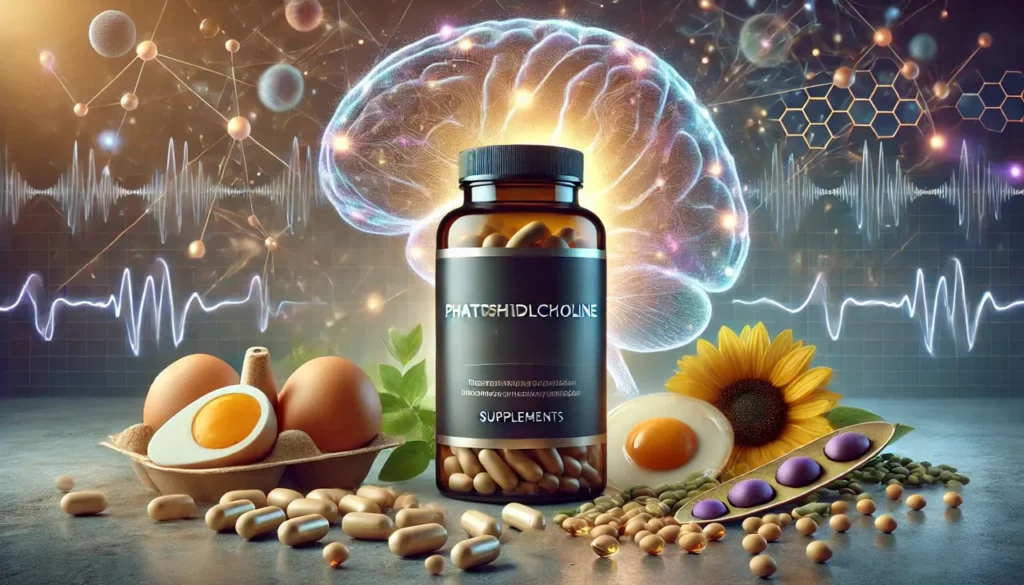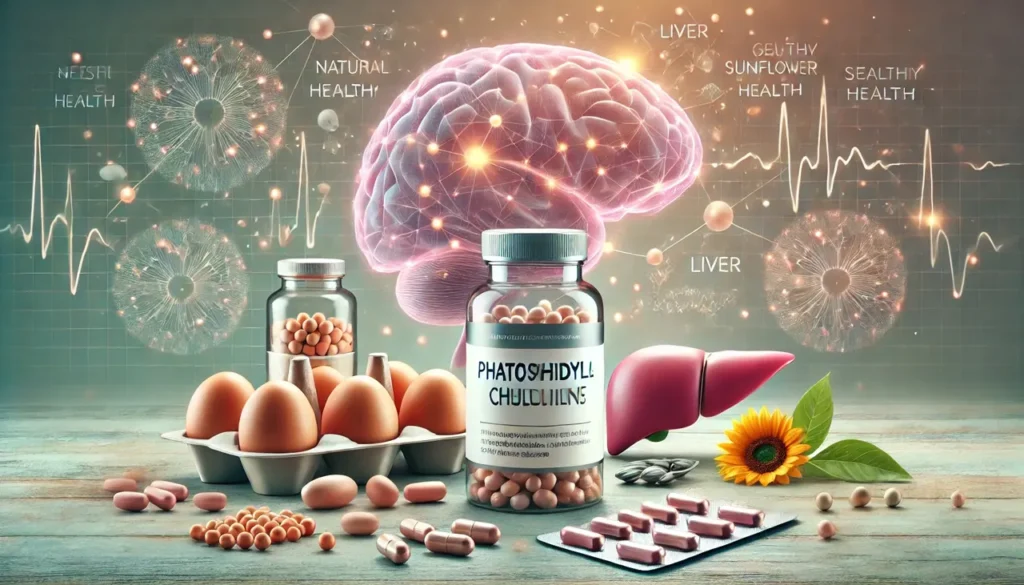Phosphatidylcholine (PC) is a phospholipid that has garnered significant attention for its wide-ranging health benefits, particularly in supporting liver function, cognitive abilities, and overall neurological health. As a vital component of cell membranes, PC plays an essential role in cellular signaling and membrane integrity. This article explores the chemical structure of phosphatidylcholine, its physiological mechanisms, nootropic benefits, recommended dosages, safety profile, potential side effects, and interactions with other supplements and medications.
You May Also Like:
Sources of Phosphatidylcholine
Phosphatidylcholine is naturally present in a variety of foods, with certain sources particularly high in this beneficial compound. Key dietary sources of phosphatidylcholine include:
- Egg Yolks: Often considered one of the richest sources of phosphatidylcholine, a single egg yolk can contain approximately 680 mg of PC.
- Soybeans: A commonly used source of supplemental phosphatidylcholine, soybeans are a versatile food ingredient.
- Sunflower Seeds: These seeds offer a plant-based option for obtaining phosphatidylcholine.
- Organ Meats: The liver, especially from beef or chicken, is a significant source of phosphatidylcholine, contributing to its neuroprotective value.
- Seafood: Certain types of fish, such as sardines and salmon, are also rich in phosphatidylcholine, thus enhancing their overall nutritional profile.
Most commercially available supplements derive phosphatidylcholine from either soybeans or sunflower seeds. Soy-derived phosphatidylcholine is more common, while sunflower lecithin has gained popularity as a non-GMO and soy-free alternative, making it suitable for individuals with dietary restrictions.

Chemistry of Phosphatidylcholine
Phosphatidylcholine is classified as a glycerophospholipid, composed of a glycerol backbone, phosphate group, fatty acids, and choline. The unique structure of phosphatidylcholine features a hydrophobic tail, allowing it to integrate into cell membranes, while its hydrophilic head enhances water solubility. This combination makes phosphatidylcholine the most abundant and functionally significant phospholipid in biological membranes.
Upon digestion, phosphatidylcholine is metabolized into its component parts: choline and phosphatidic acid. Choline is a crucial precursor for acetylcholine, a neurotransmitter essential for memory, attention, and learning. Phosphatidic acid, on the other hand, plays a vital role in cell growth, repair, and intercellular communication. By providing a direct source of choline, phosphatidylcholine facilitates the synthesis of acetylcholine, which is intricately linked to cognitive functions.

Physiological Mechanisms of Phosphatidylcholine in the Body and Brain
Phosphatidylcholine is instrumental in maintaining cellular health, making it especially beneficial for the liver, brain, and other metabolically active tissues. In the liver, phosphatidylcholine supports fat metabolism and bile secretion, crucial for the digestion and absorption of dietary fats. By enhancing lipid transport and preventing fat accumulation in the liver, phosphatidylcholine has shown promise in managing liver conditions, particularly non-alcoholic fatty liver disease (NAFLD).
In the brain, the choline component of phosphatidylcholine directly influences acetylcholine synthesis. Acetylcholine is a key neurotransmitter involved in memory formation, attention, and neuroplasticity—the brain’s ability to adapt and reorganize itself. Furthermore, phosphatidylcholine contributes to the structural integrity of neuronal cell membranes, essential for maintaining communication between brain cells.
The neuroprotective effects of phosphatidylcholine extend beyond structural support. It helps reduce inflammation and oxidative stress, two factors significantly associated with cognitive decline and neurodegenerative diseases such as Alzheimer’s. Research indicates that supplementation with phosphatidylcholine may enhance membrane fluidity, helping to protect brain cells from oxidative damage while promoting overall cognitive resilience.
Promote Nerve Health and Mental Resilience with Premium Phosphatidylcholine—Buy Now on Amazon!

Potential Nootropic Benefits of Phosphatidylcholine
Phosphatidylcholine, traditionally recognized for its liver health benefits, has gained recognition as a nootropic supplement due to its rich choline content and its role in acetylcholine production. Some key cognitive benefits of phosphatidylcholine include:
- Memory Enhancement: The choline derived from phosphatidylcholine contributes to acetylcholine synthesis, which is critical for memory and learning. Studies suggest that increased choline levels could improve recall and cognitive processing, particularly in older adults experiencing mild cognitive decline.
- Improved Focus and Mental Clarity: By supporting acetylcholine levels, phosphatidylcholine may enhance focus and mental clarity, reducing cognitive fatigue and promoting sustained mental effort. Users often report feeling more alert and engaged during tasks.
- Neuroprotection Against Aging: The antioxidant properties of phosphatidylcholine aid in reducing inflammation and oxidative stress in the brain. These protective effects are essential in combating age-related cognitive impairment and neurodegenerative diseases.
- Mood Stabilization: Choline, as a precursor to acetylcholine, influences the brain’s mood-regulating systems. While more research is needed, phosphatidylcholine has shown potential in supporting emotional well-being and stress resilience, offering a natural option for mood stabilization.
- Enhanced Neuroplasticity: Phosphatidylcholine may promote neuroplasticity, the brain’s ability to reorganize itself by forming new neural connections. This enhancement is crucial for learning new skills and adapting to new experiences, making it a valuable asset for individuals seeking cognitive improvement.
- Support for Cognitive Function During Stress: During periods of high stress, phosphatidylcholine may help maintain cognitive function by supporting neurotransmitter balance. This can be particularly beneficial for students or professionals facing demanding workloads, allowing them to perform better under pressure.

Dosage and Supplementation Guidelines
Phosphatidylcholine supplements vary in their choline concentration, typically ranging from 420 mg to 2,000 mg per dose, depending on the formulation and intended use. For general cognitive support, a common dosage recommendation for phosphatidylcholine is between 300 mg and 800 mg per day, with approximately 10-20% of this amount providing choline. However, higher doses may be necessary for specific health conditions, such as liver support.
- General Nootropic Dosage: A daily dose of 300 mg to 600 mg of phosphatidylcholine is often sufficient for cognitive enhancement, providing an effective amount of choline to support brain health without overwhelming the system.
- Therapeutic Dosage: For liver health and more intensive cognitive support, doses as high as 1,200 mg may be employed under medical supervision. Consulting a healthcare professional is advisable before exceeding standard dosages.
- Supplement Forms: Phosphatidylcholine is available in various forms, including capsules, soft gels, and liquids. For individuals with soy allergies, sunflower lecithin-based phosphatidylcholine offers a viable and effective alternative.
Protect Brain and Nerve Cells with Scientifically Backed Phosphatidylcholine—Order Now on Amazon!

Side Effects and Safety
Phosphatidylcholine is generally regarded as safe for most individuals when taken at recommended doses. However, high doses or prolonged use may lead to some side effects, including:
- Gastrointestinal Distress: Some users may experience mild digestive issues, such as nausea, diarrhea, or abdominal discomfort, particularly at higher doses.
- Body Odor: In rare cases, high levels of choline may lead to a fishy body odor due to the accumulation of trimethylamine, a byproduct of choline metabolism.
- Low Blood Pressure: Phosphatidylcholine may have a mild hypotensive effect, which could pose risks for individuals with naturally low blood pressure.
- Allergic Reactions: Those with soy allergies should avoid soy-derived phosphatidylcholine and opt for sunflower-based alternatives to prevent allergic reactions.
Interactions with Other Supplements and Medications
Understanding the potential interactions between phosphatidylcholine and other medications or supplements is crucial for maximizing its benefits and minimizing risks. Some noteworthy interactions include:
- Acetylcholinesterase Inhibitors: These medications, used in the treatment of Alzheimer’s disease (e.g., donepezil), increase acetylcholine levels in the brain. Combining phosphatidylcholine with these drugs may amplify their effects, potentially leading to cholinergic overstimulation, characterized by symptoms such as muscle cramps, sweating, and low blood pressure.
- Anticholinergic Medications: Certain antihistamines and antidepressants have anticholinergic effects that inhibit acetylcholine’s action in the brain. Supplementing with phosphatidylcholine while on these medications may help mitigate anticholinergic side effects, but individuals should consult their healthcare provider for personalized guidance.
- Other Nootropics: Phosphatidylcholine can be safely combined with other nootropics, such as L-theanine or racetams, to enhance cognitive benefits. However, caution is advised when combining it with other cholinergic nootropics like alpha-GPC or CDP-choline, as this may lead to excessive acetylcholine production and side effects like headaches or irritability.
- Statins and Lipid-Lowering Agents: Some studies indicate that phosphatidylcholine may enhance the effects of statins, which are commonly used to lower cholesterol levels. While this combination may lead to improved cholesterol management, it necessitates careful monitoring by a healthcare professional to avoid excessively low cholesterol levels.
- Blood Pressure Medications: Phosphatidylcholine’s potential to reduce blood pressure, although mild, may interact with antihypertensive medications, leading to an excessive drop in blood pressure. Individuals on blood pressure-lowering drugs should exercise caution when considering phosphatidylcholine supplementation.
Risks for Individuals with Certain Health Conditions
While phosphatidylcholine is generally safe, certain health conditions may necessitate caution and professional consultation before starting supplementation. Some considerations include:
- Liver Conditions: Although phosphatidylcholine may benefit individuals with liver issues such as non-alcoholic fatty liver disease, high doses could stress liver function, especially in individuals with advanced liver disease.
- Kidney Disease: Excessive intake of phosphatidylcholine may lead to choline accumulation, which the kidneys may struggle to excrete effectively. Individuals with kidney disease should consult their healthcare provider before supplementation.
- Pregnancy and Breastfeeding: The safety of high-dose phosphatidylcholine supplementation during pregnancy and breastfeeding is not well-established. Pregnant or nursing individuals should consult their healthcare provider before use.
Enhance Memory and Mental Clarity with Trusted Phosphatidylcholine—Shop Today on Amazon!

Phosphatidylcholine for Cognitive and Liver Health Enhancement
Phosphatidylcholine emerges as a versatile supplement with significant potential for enhancing cognitive function and supporting liver health. By acting as a precursor to acetylcholine, it helps facilitate memory enhancement, improved focus, and neuroprotection against cognitive decline. However, individuals should approach supplementation with a clear understanding of appropriate dosages, potential side effects, and interactions with medications. As always, it is advisable to consult with a healthcare professional before starting any new supplement regimen, especially for those with pre-existing health conditions or who are taking other medications.

References:
- What Is Phosphatidylcholine? Benefits, Uses, Forms & Side Effects. Retrieved from: https://draxe.com/nutrition/phosphatidylcholine
- Anti-inflammatory Effects of Phosphatidylcholine. Retrieved from: https://www.jbc.org/article/S0021-9258(20)58787-5/fulltext
- Phosphatidylcholine – Uses, Side Effects, and More. Retrieved from: https://www.medicinenet.com/phosphatidylcholine_benefits_side_effects/article.htm
- Retarded release phosphatidylcholine benefits patients with chronic active ulcerative colitis. Retrieved from: https://pubmed.ncbi.nlm.nih.gov/15951544/
Important Note: The information contained in this article is for general informational purposes only, and should not be construed as health or medical advice, nor is it intended to diagnose, prevent, treat, or cure any disease or health condition. Before embarking on any diet, fitness regimen, or program of nutritional supplementation, it is advisable to consult your healthcare professional in order to determine its safety and probable efficacy in terms of your individual state of health.
Regarding Nutritional Supplements Or Other Non-Prescription Health Products: If any nutritional supplements or other non-prescription health products are mentioned in the foregoing article, any claims or statements made about them have not been evaluated by the U.S. Food and Drug Administration, and such nutritional supplements or other health products are not intended to diagnose, treat, cure, or prevent any disease.


